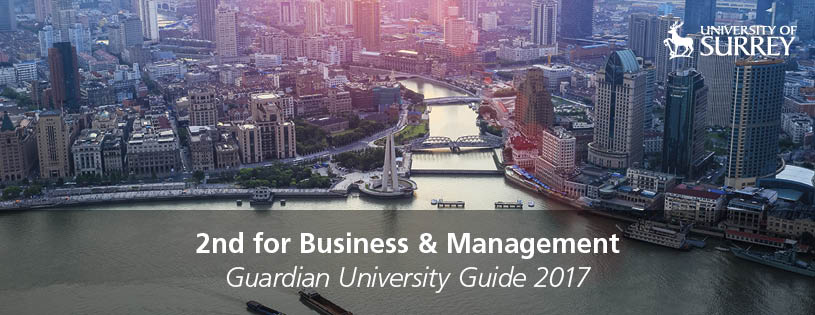I’m not normally a competitive person, where I finish isn’t usually important to me.
When I was a student, many years ago, I was only ever concerned with my own grades and not whether they were higher or lower than my classmates and friends. As someone who has written about competitiveness in sports like rugby union and cricket, my lack of competitiveness is often a source of surprise to people I work with.
And then The Guardian published their 2017 University Guide and Surrey Business School came second in their league table for Business, Management and Marketing. Second. Just behind Oxford but ahead of Cambridge, Warwick, Manchester, Durham and all the rest.
I wasn’t surprised about how well we did because I know how hard we work and how important our student experience is to us. I was a little surprised about how pleased I was because league tables don’t usually bother me. I was though incredibly proud of where we have ended up and how we have got here and so taking stock and reflecting on that seemed like a good idea.
As a business school, we’re five years old this summer and, in academic time, that is no time at all. I joined the University in 2002 so I’ve been around a lot longer than the Business School. I’ve also been around longer than the 5G Innovation Centre, Surrey Sports Park and the Vet School. When I started here, the Ivy Arts Centre was a gym, GSA was a car park and Engineering for Health was a branch of NatWest. We had two management schools and there was no National Student Survey or Research Excellence Framework.
Now we’re a top 5 university and a top 2 Business School and this is what I’ve learnt from this journey:
- There’s no such thing as overnight success, there’s no silver bullet or short-cuts, tricks of the trade don’t make you successful. Hard work over a long period of time is what makes you successful. K Anders Ericcson created the 10,000 hours rule and he was absolutely right – the harder you work, the better you get;
- Vision is important. Having a plan to deliver the vision is important. But what you do is most important. You don’t lose weight by planning to go to the gym. You don’t lose weight by going to the gym and watching people on exercise bikes. You lose weight by getting on the bike and doing some pedalling. Success happens when you put ideas into action;
- The best advert for a university business school is its students and graduates – what are they like when they arrive, what are they like when they leave, what do they know and, just as importantly, what can they do?
And what of the next five years? I don’t know where we’ll be in the league tables but I do know we have big plans and ambitions. We’ll be bigger – more academics, more students, more cutting edge research, more impact. We’ll have even better links with business – next year our students will be working with Google, Nielsen, The Page Group, Facebook and a bunch of other world-leading, household name companies. Our research will be amazing, we will be leading in areas as diverse as digital economy, leadership and sustainability.
Five years old and it’s great to be second in the league tables. It’s also great to know that we have big plans for the next five years. It’s even better to know that we’re already doing things to put those plans into action.

